

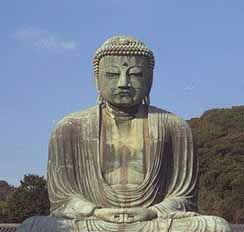
The title Buddha means Enlightened One or Awakened One.
In Bhuddism, the Buddha refers to Siddhattha Gautama.
Few of the details of the Buddha's life can be independently verified, and it is difficult to determine what is history and what is myth.
According to most Buddhist traditions, Siddhattha Gautama, the future Buddha lived many lives before coming to our present world era. In his many existences during the long, long period of time and in the one hundred thousand worlds, the future Buddha had fulfilled the Ten Paramitas, and, in order to save this world, he was to be born in our era and to become a fully enlightened Buddha.
Siddhartha Gautama was born in Lumbini (a town situated in modern Nepal, near the Indian border) under the full moon of May to the clan of the Shakyas, a warrior tribe. The day of his birth is widely celebrated in Buddhist countries as Vesak. Gautama's father was the king of Kapilavastu in Magadha, and Gautama was born a prince, destined to a life of luxury.
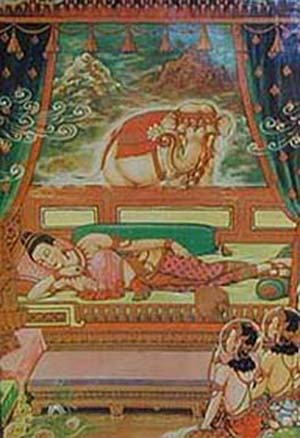
Before Siddartha Gautama's birth, his mother dreamed
of a white elephant presenting her with a lotus flower.
Since King Suddhodana had long awaited a child, he and everyone else in the palace rejoiced at the birth of a son. The King immediately called a famous wise sage, Asita. Asita told the king, "If he remains at home, the child will become the Wheel-rolling King. If he leaves home, he will become the great teacher, the Buddha."
His father, wishing for Gautama to be a great king, shielded his son from religious teachings or knowledge of human suffering.
His mother Maya, died, on the seventh day after her delivery and Maya's sister, Mahapajapati became the step mother of Siddhattha. The prince grew up in an environment of care and love, respect and joy. However, he was sometimes unhappy.
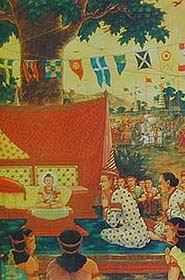
Buddha studied science and technology, art and philosophy, religious knowledge under the tuition of famous scholars, riding, archery, and fencing. He excelled at everything. His expected much from his son and made him crown prince and heir apparent.
But this did not please the young man, who steadily grew to be thoughtful and depressed.
To cheer him up, his worried father and foster mother built three palaces, one for cold weather, one for hot weather, and one for the rainy season. They appointed many beautiful court ladies to wait on him and arranged banquets with dancing and music.
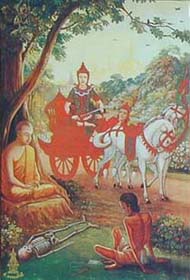
At the age of thirteen, Gautama was escorted by his attendant Channa on four subsequent visits outside of the palace.
There, he came across the "four sights": an old crippled man, a diseased man, a decaying corpse, and finally an ascetic. Gautama realized then the harsh truth of life - that death, disease, age, and pain were inescapable, that the poor outnumbered the wealthy, and that even the pleasures of the rich eventually came to nothing.
"The four sights/gates" represent the state of mind of the prince with respect to the suffering of aging, illness and death. Superficial prosperity in economy and relative stability in political environment cannot relieve people from worry, fear, anxiety and suffering and cannot lead them to ultimate happiness.
As the boy reached the age of 16, his father arranged a marriage to a cousin of the same age, Yashodhara, and she gave birth to a son, Rahula. Although his father ensured that Gautama was provided with everything he could want or need, Gautama was constantly troubled and internally dissatisfied.
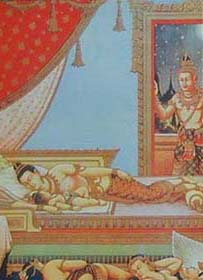
Though his love to his family may have hindered him, the birth of his son, Rahula, provided a favorable occasion for his departure since with the birth of his son, Siddattha had fulfilled his karma to his father and his wife according to the Indian tradition.
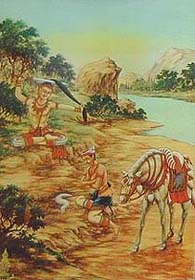 Departing from the palace and the wearing rags, the prince chose to become a Samana.
Departing from the palace and the wearing rags, the prince chose to become a Samana. 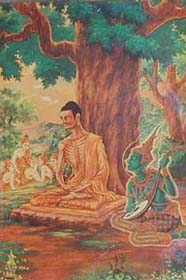
During that time, Siddhatha went to Rajagaha, the capital of Magadha, which was the centre of culture with many orthodox and unorthodox monks.
By that time, the two major disciplines for the sake of enlightenment were meditation and ascetic austeritics.
Siddhattha studyied meditation under two famous teachers, Alara-Kalama and Uddaka-Ramaputta.
The state attained by Alara-Kalama was that of a much higher formless world where physical matter no longer exists.
Uddaka-Ramaputta reached an even higher state at which neither thought nor non-thought existed.
Siddhatha did not find it difficult to attain either state.
Attaining these states of mind did not ease his mental anxieties, because once he stopped meditation, he returned to the mental state of depression.
He knew that the true liberation from the attachment of ignorance and suffering could be attained only by reaching a state of absolute tranquility.
He left his teachers to continue his search for the ultimate truth.
He next practised asceticism, which was very common among Samanas. They believed that the human suffering was caused by the attachment to the physical body and the mental spirit. Suffering can only be freed by detaching the spirit imposed by the body. Therefore, they tormented themselves for the purpose of weakening the power of the physical body over the mental spirit, until the body was destructed.
Siddhattha passed through the country of Magadha to the town of Uruvela, where he settled in a grove of trees to find enlightenment.
Practising austerities for six years, he was extremely tough on himself and put himself through many difficult tests after which was became so weak his body was nothing more than skin and bones.
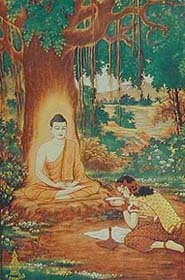 Soon thereafter, a young woman offered the future Buddha a bowl of rice and milk.
Soon thereafter, a young woman offered the future Buddha a bowl of rice and milk. He accepted it, restored his strength, and began his practice anew.
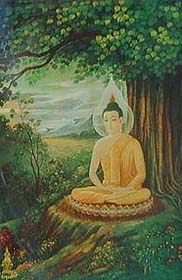
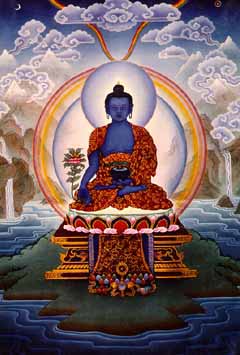
2. The Noble Truth of The Arising of Suffering: Suffering has an origin - The Threefold Craving leads every being from birth to birth and is accompanied by joy and lust, seeking its gratification here and there, namely: Sensual Craving, Craving for Existence and Craving for Wealth and Power. There are also a sixfold craving, namely the eye craves for forms, the ear craves for sounds, the nose craves for odours, the tongue craves for taste, the body craves for objects, and the mind craves for noun, dreams or illusions. These Cravings and ignorance of the law of nature are the condition of origin of individual suffering.
3. The Noble Truth of the Cessation of Suffering: Suffering Can Cease - The condition of cessation of suffering is the complete fading away and extinction of this three fold craving, forsaking it and giving it up, the liberation and detachment from it. The condition of mind of a person who has been giving up his threefold cravings or this sixfold craving together with ignorance can realize Nirvana (or the Extinction of the Cravings).
4. The Noble Truth of The Path leading to the Cessation of Suffering: There is a Path our of Suffering - It is the 'Noble Eightfold Path' (or the 'Middle Path' because it avoids the two extremes of sensual pleasure and self-mortification), that leads to the Cessation of Suffering.
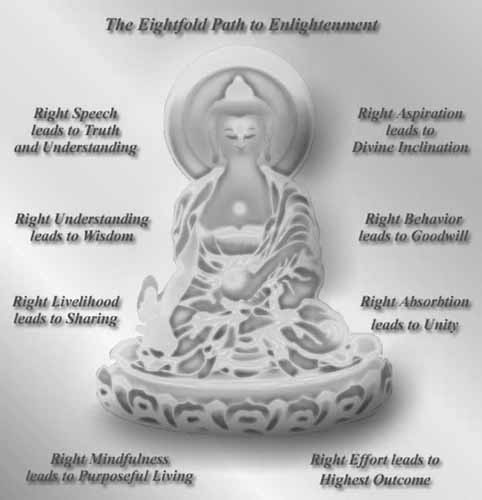
He discovered the reality of universe, and found the path to free humanity from the suffering of birth and death thus attaining eternal happiness.
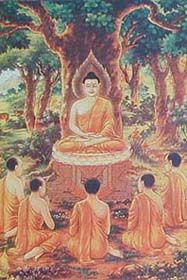
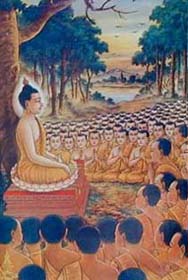
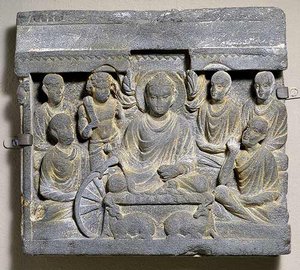
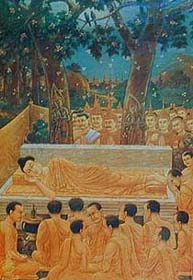
Be the one who is skilled in goodness,
And who knows the path of peace:
Let them be able and upright,
Straightforward and gentle in speech.
Humble and not conceited,
Contented and easily satisfied.
Unburned with duties and frugal in their ways.
Peaceful and calm, and wise and skillful,
Not proud and demanding in nature.
Let them not do the slightest thing
That the wise would later reprove.
Wishing: In gladness and in safety,
May all beings be at ease.
Whatever living beings there may be;
Whether they are weak or strong, omitting none,
The great or the mighty, medium, short or small,
The seen and the unseen,
Those living near and far away,
Those born and to-be-born,
May all beings be at ease!
Let none deceive another,
Or despise any being in any state.
Let none through anger or ill-will
Wish harm upon another.
Even as a mother protects with her life,
Her child, her only child,
So with a boundless heart
Should one cherish all living beings:
Radiating kindness over the entire world
Spreading upwards to the skies,
And downwards to the depths;
Outward and unbounded,
Freed from hatred and ill-will.
Whether standing or walking, seated or lying down
Free from drowsiness,
One should sustain this recollection.
This is said to be the sublime abiding.
By not holding to fixed views,
The pure-hearted one, having clarity of vision,
Being freed from all sense desires,
Is not born again into this world.
I would be honored if you would
What People are Saying
What People are Saying
I just finished reading my report and I am experiencing something I've never had happen to me before. I am feeling calm...centered...what I feel would be best described as inner peace. Honestly, the Past Life Reading exceeded my expectations! It answered so many questions for me...questions that I would never voice out loud and reassured me of my self-doubts. I found this reading to be quite unique and special! I laughed...I cried...and I feel validated. Please get this reading for yourself...in order to take care of you!
-- Elana,USSR
Let me start by saying thank you for this spectacular reading. I found it quite useful in my every day dealings with others etc. Everything now, has greater meaning than before I had this reading done. I must say I was skeptical at first, however, for the money, it was worth every cent! I would also like to venture further into my past lives, and find out just who I was in each of my past lives! Again, thank you Lakshmi Astrology.com for this reading, I will make reference to it from time to time.
-- Kapila Verma, Canada
Impressive! This is probably the single most helpful and inspirational astrological reading I have ever had. And I have had many. It really hit right on when it comes to my inner feelings and drives and confirmed what I have long felt but not expressed. For the first time in years I now see a clear path for my living, growth and expression.
-- Paul Daniel , United States